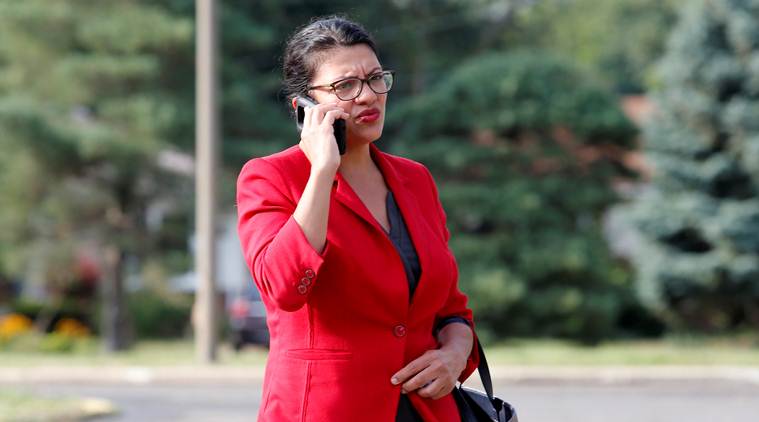- India
- International
Rashida Tlaib’s grandmother weathers global political storm from West Bank
Rashida Tlaib’s relatives had spent days busily preparing for her planned visit to the Israeli-occupied West Bank with a congressional delegation. They worked the phones, posed for photographers and chose a sheep to slaughter for a traditional Palestinian feast.
 U.S. Congresswoman Rashida Tlaib arrives for a Town Hall style meeting with her constituents in Inkster, Michigan, U.S. August 15, 2019. REUTERS/Rebecca Cook
U.S. Congresswoman Rashida Tlaib arrives for a Town Hall style meeting with her constituents in Inkster, Michigan, U.S. August 15, 2019. REUTERS/Rebecca Cook
Written by Isabel Kershner
In a small stone house on the edge of a Palestinian village, a 90-year-old woman ran a string of wooden prayer beads through her gnarled fingers Friday, silently reciting the 99 names of Allah, while a maelstrom of world politics swirled around her and her granddaughter, Rep. Rashida Tlaib.
Tlaib’s relatives had spent days busily preparing for her planned visit to the Israeli-occupied West Bank with a congressional delegation. They worked the phones, posed for photographers and chose a sheep to slaughter for a traditional Palestinian feast.
Then the emotional whiplash began. Israel, urged by President Donald Trump, denied Tlaib and a colleague entry. Instead, Israeli officials said Tlaib could come on a personal, family visit to see her aging grandmother, with conditions, and she agreed. Then, after being accused of selling out the Palestinian cause, she changed her mind.
On Friday, soon after noon prayers at the village mosque, when it looked like the congresswoman could visit the West Bank, her grandmother, Muftiya Tlaib, seemed relieved if unsure. “I’m happy that Rashida may come,” she said. “But I hear they won’t let her.”

Her son, Bassam Tlaib, 53, an electrician and the first-term lawmaker’s uncle, explained her confusion: The family, not wanting to raise her hopes in vain, had not explicitly told the grandmother about Israel’s conditional offer, announced an hour earlier.
“We don’t want any more unpleasant surprises,” he said. “Yesterday, mother was shocked and upset.”
As it turned out, the family’s hesitation proved prescient.
Explained: BDS, the global anti-Israel movement, and the Israeli law to counter its supporters
The family’s 48-hour whirlwind of hope, anger and disappointment began Thursday, when Israel denied entry to Rashida Tlaib, D-Mich., and another member of Congress, citing their support of the boycott-Israel movement.
Tlaib’s uncle and other family members said they had misgivings about the conditions for her personal visit that were imposed by Israel, which required her to promise not to “promote boycotts.” But the family said they would welcome the congresswoman under any circumstances.
“Rashida has the natural right to visit all of Palestine,” Bassam Tlaib said. But he added that, in his opinion, “I say it is preferable not to come based on these conditions.”
Then came the news that Rashida Tlaib had decided not to come.
Tlaib, 43, was born and raised in the United States. In the late 1990s she married a man from her ancestral village, Beit Ur al-Fauqa, according to her uncle, and spent the next 15 months in the picturesque and tiny hamlet near Ramallah.
She last visited over a decade ago, he said. Her grandmother fetched an iPad to show how they kept in touch through video calls and said she had seen the congresswoman on TV.
(BEGIN OPTIONAL TRIM.)
Asked about the sheep set for the planned family feast, she laughed wryly, gestured out the window, and said it was still with the flock.
Like many in the West Bank, the villagers say they are proud of Tlaib for taking a stand and supporting their cause, even while her party is generally more supportive of Israel. The local village councils had been preparing a special reception for her, with flags and welcome banners.
But the single road running through the village, with a population of about 1,000, was almost deserted Friday. Well-kept houses with red-tiled roofs, a sign of prosperity, lined the route, many of them set back from the road and surrounded by orchards.
(END OPTIONAL TRIM.)
The Tlaib family’s single-story, flat-roofed home is one of the simpler houses in the area, with a small olive grove and a few fig trees standing in its otherwise bare yard.
A few yards outside the front gate stands an Israeli military checkpoint that leads to an Israeli-built road running through the West Bank and linking Jerusalem to the city of Modiin. From the Tlaibs’ modest reception room, where small tapestries and a Quranic verse hung on the wall, traffic could be heard whizzing by.
The road, known as Highway 443, is in theory partially open to Palestinian traffic. But because most Palestinians need special permits to enter Israel, for the villagers it largely remains a road to nowhere.
Signs of the Israeli occupation surround the village on all sides, hemming in the villagers’ space to move and grow. Israel’s security barrier, a system of fences and walls that Israel said was necessary to stop suicide bombers, skirts the village. At the southern end of Beit Ur al-Fauqa, a sign points the way to Beit Horon, one of the Jewish settlements that most of the world considers to be a violation of international law.
Tlaib had hoped to highlight examples of hardships with her congressional visit, and the Israeli government said her “one-sided” itinerary was among the reasons it had originally decided to deny her entry.
“This visit was meant to carry a message,” said Ashraf Samara, head of Beit Ur al-Fauqa’s council, “that among the members of Congress there are people with a different point of view about Israel.”
“The Israeli rejection confirmed everything we believe,” Samara said. “They may have democracy for themselves,” he said of the Israelis, “but not when it comes to people with a different opinion.”
He added, “We are a very small village. We are proud that the most important leader in the world is speaking about us. We are influencing international policy! We are very proud of what Rashida has done.”
Naziha Zahran, 72, a neighbor, said she didn’t keep up with the news or politics. But she remembered Tlaib as being “very smart” and “a strong character.” Her grandfather, who died several years ago, “predicted that she would be in an important position one day,” Zahran said.
By dusk Friday, after the congresswoman changed her mind about visiting, her uncle said that the family supported Tlaib’s decision.
“If she comes,” he said by phone, “she should maintain her dignity and do so unconditionally.”
He said the family had convinced Tlaib’s grandmother that her decision was for the best.
Explaining her choice not to go, Tlaib invoked the grandmother she had wanted to see. “Visiting my grandmother under these oppressive conditions stands against everything I believe in,” the congresswoman wrote on Twitter.
“Silencing me & treating me like a criminal is not what she wants for me,” she said of “my sity,” using an Arabic term for grandmother. “It would kill a piece of me.”
Apr 25: Latest News
- 01
- 02
- 03
- 04
- 05








































